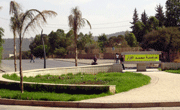A partir de cette page vous pouvez :
| Retourner au premier écran avec les recherches... |
 . Biblio-FLSHO
. Biblio-FLSHO
 |
1 résultat(s)

 Affiner la recherche
Affiner la recherche

 Affiner la recherche
Affiner la rechercheAutomata and languages / John M. Howie
Titre : Automata and languages Type de document : texte imprimé Auteurs : John M. Howie Editeur : Oxford [Grande Bretagne] : Clarendon press Année de publication : 1991 Importance : x, 294 p. Présentation : ill. Format : 24 cm ISBN/ISSN/EAN : 978-0-19-853424-2 Index. décimale : 511 Principes généraux des mathématiques Résumé : Theoretical models of simple computing machines, known as automata, play a central role in computer science. This textbook presents an introduction to the theory of automata and to their connection with the study of languages. At the heart of the book is the notion that by considering a language as a set of words it is possible to construct automata which "recognize" words in the language. Consequently one can generate a correspondence between a hierarchy of machines and a corresponding hierarchy of grammars and languages. The author leads the reader from finite status automata through pushdown automata to Turing machines. He demonstrates clearly and elegantly the fundamental connections between automata and abstract algebra via the concepts of syntactic monoid and minimal automaton. The author presupposes a basic familiarity with algebra, but beyond this the book is self-contained. As a result, it will make ideal reading for students of mathematics and computer science approaching this subject for the first time. Automata and languages [texte imprimé] / John M. Howie . - Oxford (Grande Bretagne) : Clarendon press, 1991 . - x, 294 p. : ill. ; 24 cm.
ISBN : 978-0-19-853424-2
Index. décimale : 511 Principes généraux des mathématiques Résumé : Theoretical models of simple computing machines, known as automata, play a central role in computer science. This textbook presents an introduction to the theory of automata and to their connection with the study of languages. At the heart of the book is the notion that by considering a language as a set of words it is possible to construct automata which "recognize" words in the language. Consequently one can generate a correspondence between a hierarchy of machines and a corresponding hierarchy of grammars and languages. The author leads the reader from finite status automata through pushdown automata to Turing machines. He demonstrates clearly and elegantly the fundamental connections between automata and abstract algebra via the concepts of syntactic monoid and minimal automaton. The author presupposes a basic familiarity with algebra, but beyond this the book is self-contained. As a result, it will make ideal reading for students of mathematics and computer science approaching this subject for the first time. Exemplaires
Cote Section Localisation Code-barres Disponibilité Numero_inventaire 511 HOA Mathématiques Biblio-FLSHO L 24628 Disponible L 24628





